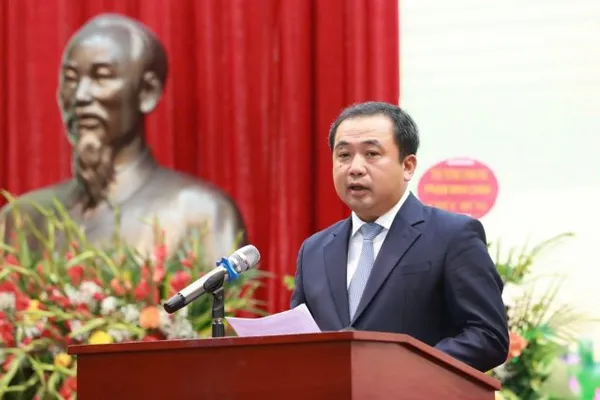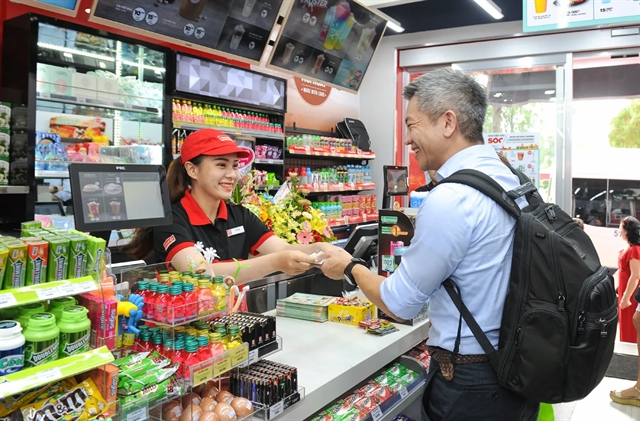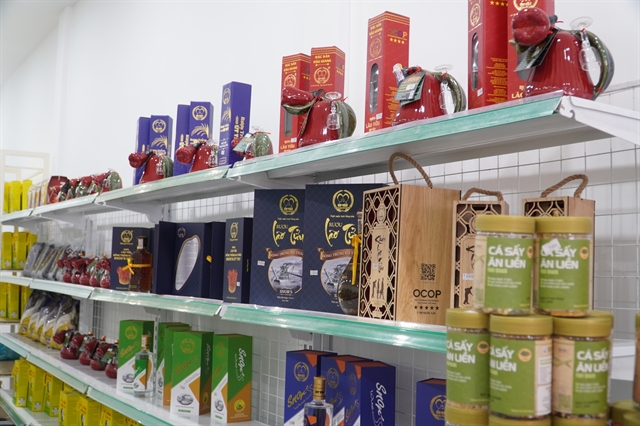 Society
Society
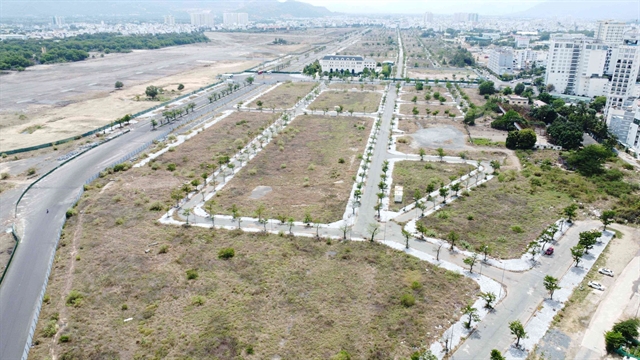
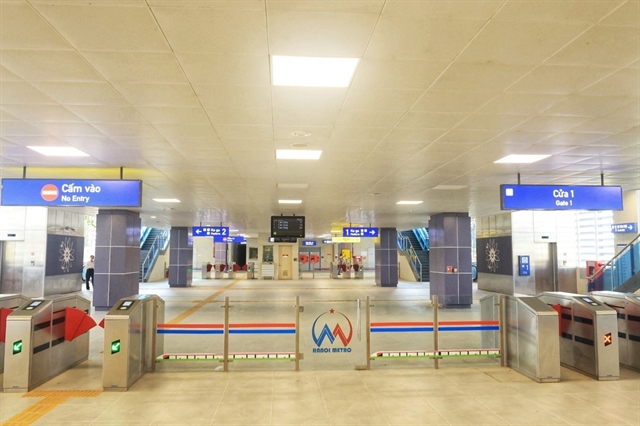 |
| The boarding and lighting areas at a station of the Nhổn-Hà Nội Railway Station urban railway line on Wednesday.—VNA/VNS Photo Tuấn Anh |
HÀ NỘI — The much-awaited Nhổn-Hà Nội Railway Station metro will begin commercial operations on its elevated section from 8am Thursday, the Hà Nội Metropolitan Railway Management Board has announced on Wednesday evening.
This is the second metro line to be operational in Việt Nam.
Passengers of the Nhổn-Hà Nội Railway Station urban railway line will enjoy free travel for the first 15 days, per the resolution from Hà Nội People's Council.
Following the initial period, the standard monthly fare will be VNĐ200,000 (US$8). A 50 per cent discount will be available for students and industrial workers.
The ticket will be VNĐ140,000 ($5.5) for those purchasing group tickets of 30 or more.
Single journey tickets will be priced at VNĐ24,000 ($1), allowing unlimited travel along the line for the day.
Tickets for travel between stations will range from VNĐ8,000 ($0.3) to VNĐ12,000 ($0.5). A day pass with unlimited rides costs VNĐ24,000.
In the first three months, the opening time will be 5:30am and the closing time will be 10pm, with train available every 10 minutes.
In contrast to the Cát Linh-Hà Đông urban railway line, passengers on the Nhổn-Hà Nội Railway Station urban railway line will use circular tickets which resemble coins.
To pass through ticket barriers, passengers will scan their tickets to open the gates and insert them into a validating machine at their destination to exit.
Tickets are valid for 20 minutes from purchase - failure to board the train within the period requires a visit to the ticket counter for validation.
“Initially, the elevated section of the Nhổn- Hà Nội Railway Station will adopt a provisional pricing model for fares and maintenance, similar to the Cát Linh-Hà Đông line,” said Vũ Hồng Trường, General Director of Hà Nội Metro Company - the unit which is responsible for managing, operating and maintaining the urban railway line.
Reducing traffic congestion
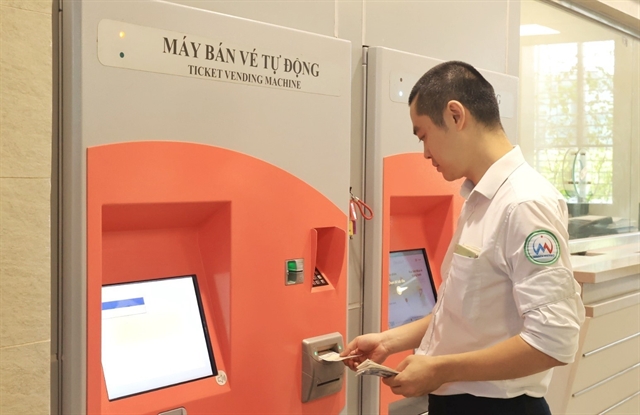 |
| A member of staff checks the automatic ticketing system at a station of the Nhổn-Hà Nội Railway Station urban railway line on Wednesday.—VNA/VNS Photo Tuấn Anh |
Traffic experts believe that the operation of the Nhổn-Hà Nội Railway Station urban railway line will significantly alleviate traffic congestion in the city.
Khương Kim Tạo, former Deputy Chief of the National Committee for Traffic Safety, said the new metro line would have great value in transporting passengers on the routes the train passes through, thereby reducing traffic jams and environmental pollution in the city. However, "tight integration with bus services near metro stations is crucial,” he said.
Buses should be strategically positioned to facilitate easy transfers to the metro line and to aggregate passengers for onward journeys within the city.
Additional bus routes connecting the Cát Linh-Hà Đông and Nhổn-Hà Nội Railway Station lines were essential for maximising operational efficiency once both lines were run, he said.
Tạo also said well-planned parking facilities for private vehicles such as cars and mopeds, were needed at metro stations to encourage transport behaviour shifts.
The strategy should include medium to long-term plans with projections for passenger demand growth.
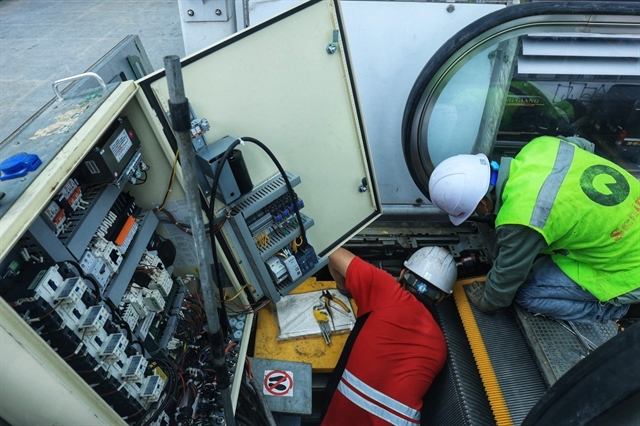 |
| Technical staff check the automatic elevator system at a station of the Nhổn-Hà Nội Railway Station urban railway line on Wednesday.—VNA/VNS Photo Tuấn Anh |
Phan Lê Bình, from Consultants Global Co., Ltd., said that the ticketing and validation systems of the Nhổn-Hà Nội Railway Station and Cát Linh-Hà Đông lines were different, which might pose initial challenges for passengers.
The city should explore solutions for a unified payment system across different public transport modes to make travel more convenient and secure for residents, he said.
Bình also recommended that the city should allocate land for pickup and drop-off points for taxis, buses, ride-hailing services and motorbike taxis, segregated from general traffic to ensure safety and order.
Prepared for launch
The Hà Nội Metro Company has trained 353 train drivers and is fully prepared with operational staff, supported by contractors and consultants.
The technical design of the elevated section of the Metro Nhổn-Hà Nội Railway Station urban railway line features trains with four cars, each carrying 236 passengers, with a total capacity of 944 passengers per train.
The company plans to operate four to six trains, with a six-minute interval during peak hours, with ten trains an hour in each direction.
The line’s maximum transport capacity is projected at 9,440 passengers per hour, per direction.
The Hà Nội Traffic Management and Operation Centre has also finalised plans to enhance passenger connectivity and transfers via buses.
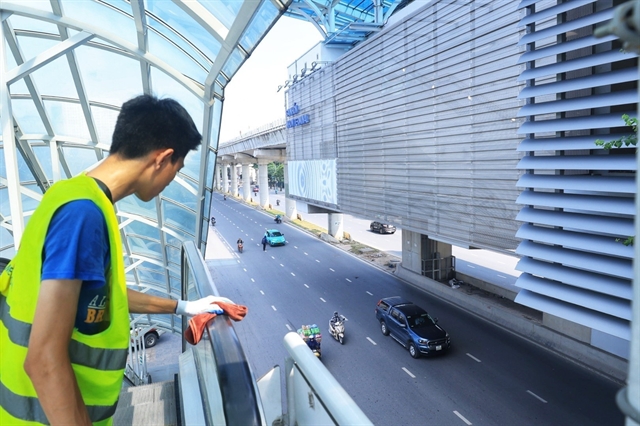 |
| A worker cleans the stairwell before commercial operation of the elevated section of the Nhổn-Hà Nội Railway Station urban railway line on Wednesday.—VNA/VNS Photo Tuấn Anh |
Currently, 36 bus routes are operated along the metro corridor, with 32 bus stops, 16 with shelters at key transfer points in Cầu Giấy and Nhổn.
Eight metro stations are located within 50 metres of the nearest bus stop.
Notably, nine bus routes connect the Cát Linh-Hà Đông and Nhổn-Hà Nội Railway Station lines, meeting approximately 15-30 per cent of the total travel demand along the route.
The Nhổn- Hà Nội Railway Station urban railway line spans 12.5 km, with the elevated section covering 8.5 km and the underground section covering 4 km.
The metro project started in 2009 and was originally slated to be finished in 2015 but after delays and setbacks, the final completion date is now 2027. — VNS



